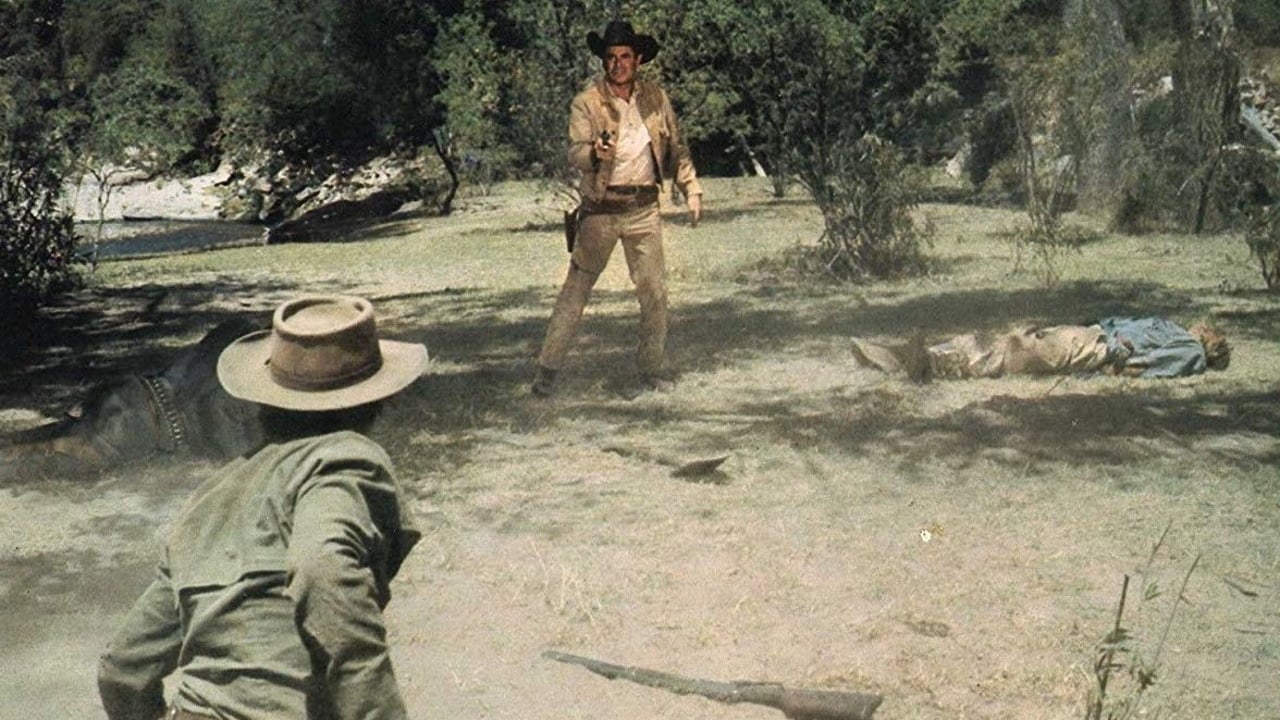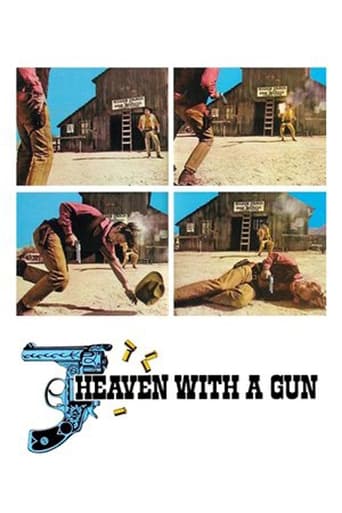

Absolutely brilliant
... View MoreI have absolutely never seen anything like this movie before. You have to see this movie.
... View MoreThe story, direction, characters, and writing/dialogue is akin to taking a tranquilizer shot to the neck, but everything else was so well done.
... View MoreThe thing I enjoyed most about the film is the fact that it doesn't shy away from being a super-sized-cliche;
... View MoreIn many ways, this movie is mediocre and formulaic. There is a conflict between cattlemen and sheepherders. As usual, the sheepherders are good and the cattlemen are bad. Enter Jim Killian (Glenn Ford), the gunfighter who wants to hang up his gun and become a pastor, but not before he uses his gun one last one last time. Finally, there are some whores with a heart of gold, headed by Madge (Carolyn Jones).At the same time, the formula has been modified to suit the late 1960s. To begin with, there are a couple of Native Americans that are also sheepherders, consisting of a father and daughter. The father is hanged by a couple of the cattlemen, one of which is Coke (David Carradine), leaving Leloopa (Barbara Hershey) orphaned. When Killian walks into the small house he just bought, he finds Leloopa inside, cooking some baby rattlesnake. Because Killian cut her father down and buried him, she says that she now belongs to Killian, otherwise Hopi law says her father's soul will wander forever. Killian is forced to relent. The fact that they will be living together in a one-room house creates a little taboo tension: They are not married, she is a minor, they are of different races, and we are not sure whether she thinks of herself as a daughter to Killian or as his wife, giving us a tinge of incest. However, Killian leaves at night to sleep somewhere else, presumably at the hotel.Leloopa mentions that her mother was white, a captive whom her father married. In the old days, her mother would have been raped, but movies were trying to portray Native Americans in a more favorable light by this time. Because of this trend of treating Native Americans in the movies in this way, it shocks us a little when Killian tells her she is going to have to take a bath, and she has no idea what a bath is. Leloopa says it was her mother who taught her English, but her mother apparently didn't bother to teach Leloopa about bathing, so I guess her mother went completely native. But why, we ask ourselves, would a movie made as late as 1969 suggest that Hopi Indians are a bunch of dirty, smelly savages?The answer is that the movie wants to titillate us some more. You see, when Barbara Hershey is in a movie, it is usually just a matter of time before she gets naked. In fact, when Killian tells Leloopa that in order to bathe, you first have to take your clothes off, we are not surprised when she starts undressing right in front of him. He stops her, however, and leaves the house so she can have some privacy.Later in the movie she manages to get raped. Coke starts making advances to her in the street. Instead of remaining in the street where there are plenty of people around, she gets the bright idea of running into a barn, which means that Coke can rape her in private. We figure, "All right, this is where we get to see Barbara Hershey naked." But she is only partially undraped as she leaves the barn.Killian beats up Coke. Finally, that night, when he gets home, Barbara Hershey is sitting outside completely naked, although we only get to see enough of her body to give the movie an M rating ("M" for mature, a designation eventually replaced by PG). She says she knows he is trying to find her another place to stay. After he puts her to bed, she asks if he will stay with her, which was probably the real reason she got naked and not all that Hopi nonsense she was spouting. But he leaves.After Killian kills Mace (J.D. Cannon), the gunslinger that had been hired by chief cattleman Asa Beck (John Anderson), Madge convinces him that if he really wants to hang up his guns and become a pastor, he must stop killing. That makes sense. But what to do about all those evil cattlemen threatening to wipe out all the sheepherders? Here we see another influence of the 1960s. Killian gathers together all the townspeople, including the wives and children of the cattlemen, and they all go to the lake where there was to be a showdown, placing themselves in what would have been the middle of a battle between cattlemen and sheepherders. It is suggestive of the civil disobedience, civil rights marches, and nonviolent resistance so characteristic of the 1950s and 1960s.Finally, it becomes clear that Killian is going to allow Leloopa to stay with him, presumably as husband and wife, though that is not explicitly stated. This too is a change from the old days. Normally, Leloopa would have been off limits for Killian, not so much because they were of different races, but because she had been raped. Miscegenation was something of a taboo in the old movies, but it did happen from time to time, as in "Broken Arrow" (1950). But a raped woman was damaged goods, and the movies usually figured out some way to keep the protagonist from marrying her, as in "Man of the West" (1958), assuming she was even allowed to be alive by the end of the movie. The idea of a raped woman marrying a man and living happily ever after was just too offensive in the old days. Maybe it still is. But this movie doesn't see it as a problem.
... View MoreHeaven with a Gun is directed by Lee Katzin and written by Richard Carr. it stars Glenn Ford, Carolyn Jones, Barbara Hershey, John Anderson, David Carradine, J.D. Cannon and Noah Beery Jr. Music is by Johnny Mandel and the Metrocolor/Panavision cinematography is by Fred Koenekamp. This is a good ole late 1960s Oater, not one to rush out and see immediately, or quickly part with your cash to buy or rent - or go out and steal. But it has Glenn Ford, who maybe in the twilight of his career, but still a bad mutha with gun, shovel and a pulpit! Yep, the punching preacher indeed. Lambs to the slaughter. It's the town of Vinegarroon and a war is raging between cattle and sheep breeders. Into this walks Jim Killian (Ford), a famed gunfighter who has come to build a church and preach the bible. However, Pastor Jim is not afraid to use his guns in the name of the Lord! The God Squad. It is what it is in that respect, the cheeky kicker here is that Killian is unorthodox in his methods, anyone wanting to come to church will be guaranteed safety, important since Killian is trying to convince the cattle and sheep barons that they can co-exist, that the animals (all God's creatures of course) can do it, and thus so can the humans. Naturally some are more keen to give it a try than others - cue intimidation and bloodshed, Killian clearly has his work cut out here... The musical score is a touch out of place, one big turn of events feels completely unnecessary, while the delectable Hershey works hard but never comes close to convincing as a girl of Indian blood. Converseley the Arizona locales are nicely prominent, while Anderson does his stuff, Carradine fits well as a dastard hot-head and Beery Junior is a reassuring presence. As is Ford, a Western actor that fans can rely on, to feel safe around, it is he that keeps this on the good side of good. 7/10
... View MoreSolid acting (Noah Beery Jr, John Anderson, Glenn Ford, Barbara Hershey, and David Carradine) is compromised by formulaic direction and a script that zig-zags, forgets, remembers, and improvises, but the action occasionally rises, and the preacher-gunman conflict keeps things on track just enough to keep one watching till the end.From the distance of 2010, 60s cultural interest is raised by the film's brief, gratuitous, and confusing nudity, as well as Barbara Hershey's hippie depiction of a half-Hopi girl, but the biggest surprise may be that this otherwise predictable western was produced as late as 1969. Except for those 60s flashes, I could imagine my parents and their siblings enjoying something similar in 1955, while I would have wished for a hero less earnest and boring than Ford.Among the film's skewed lines, the oddest may be that the sheep-herder side of the range war is first identified with American Indians but is then shifted to a polygamous Mormon. I'd like to go back to 1969 and be 18 again, but no wonder I felt confused.
... View MoreA late 60's western about ruthless cattle ranchers and their ranch hands who terrorize helpless sheep ranchers, with the action alternating between the range, the ranch, and the town, itself with a thriving saloon/brothel where a lot of the action is centered. Into this arrives an ex gunfighter turned preacher played by Glenn Ford who wants to bring peace. The script nearly does the film in, although the story and late 60's permissiveness keep one watching. As well, even though the screenplay verges on being ridiculous, the acting by Ford, John Anderson (as the ruthless big cattle rancher with a sadistic son played by David Carridine) and some other parts (J.D. Cannon chews some serious scenery as hired gun Mace) elevate the entertainment quotient, and the film's ending doesn't make one feel remorse about watching this.
... View More